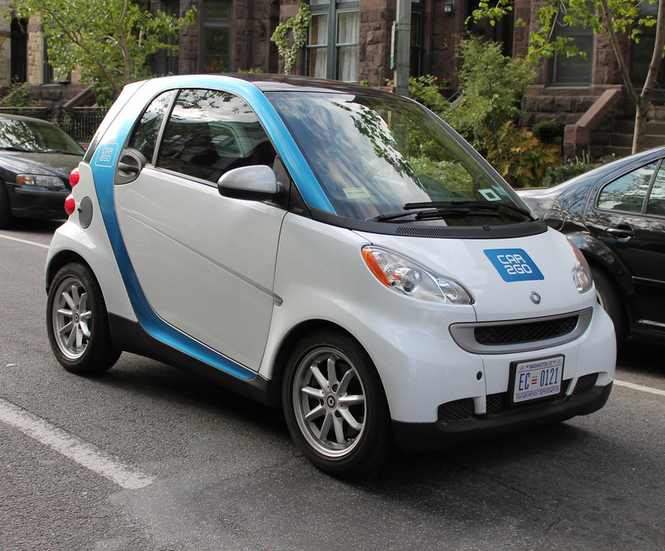This afternoon, Council Member Mark Levine will introduce a bill [PDF 1, 2] requiring DOT to give car-share companies designated on-street parking spaces, potentially for a price. Guaranteed parking would boost car sharing, Levine says, and reduce car ownership. Trouble is, there's not much data to say whether or not car-share in New York is reducing vehicle ownership or just encouraging more driving.

Levine introduced the bill days after Car2Go announced an expansion into western Queens. The company, owned by auto giant Daimler, offers a fleet of 450 Smart cars in a 36 square-mile zone covering the western half of Brooklyn, from Greenpoint to Coney Island. Starting August 29, the company is adding another 100 vehicles and eight square miles in Long Island City, Astoria, Woodside, and Sunnyside. Customers of the point-to-point service can start and end trips in any free curbside parking space.
"The focus area of Car2Go in New York currently is in Brooklyn-Queens connections, where there’s little to no subway links," Levine said. "I strongly believe this is ultimately a substitute for car ownership. In the outer boroughs, the further you get from the Central Business District, the more car ownership increases because the transit links are weaker."
There isn't enough research to back or refute Levine's intuition. That's for two reasons. First, most scholarship has focused on round-trip services like Zipcar, whose customers start and finish their trips in the same parking spot. Second, there isn't much data on cities with New York's level of density, transit service, and low car ownership rates.
Susan Shaheen, a car-share expert at the University of California, Berkeley, said car-share has a varied impact, depending on each customer's circumstances. "Many individuals will drive marginally more," she said in an email. "Other individuals will drive substantially less, as they alter their relationship with the private auto to one of necessity rather than convenience."
In fact, one of the advantages of car-share is that it calculates the cost of driving using a per-minute or per-hour rate. In contrast, car ownership frontloads big expenses like insurance and car payments, making each subsequent trip seem less expensive.
This has an impact: Shaheen's research shows that, on average, people drive 27 percent fewer miles after joining round-trip car-share services. A quarter sell their personal vehicles after joining, and another quarter postpone buying a car.
There isn't much data on the effect of one-way services like Car2Go. This fall, Shaheen is launching a study using trip data provided by the company, supplemented with before-and-after surveys of customers' travel habits. New York is not one of the five cities in the study.
"I have not seen data specific to New York City on car-sharing," Shaheen said.
Other cities require car-share companies to disclose trip data as a condition of getting access to curbside parking, Shaheen said, but the data is not typically made public because the companies wish to keep the information proprietary.
Seattle, for example, released a report earlier this year on Car2Go usage. The city received the data as a condition of allowing the company to launch a pilot program. It found an average Car2Go vehicle is used six times per day and sits between 68 and 150 minutes before being used, depending on whether it's in a metered space or a permit zone. Between three and four percent of Seattle Car2Go members reported giving up a personal vehicle after joining, but the report didn't come to any firm conclusions about how Car2Go affected the total number of miles driven in Seattle.
New York does not have a similar agreement with Car2Go, and the company's trip data is not publicly available. Car2Go says its 27,000 members have taken 280,000 trips in Brooklyn since it launched in October 2014, with an average trip time between 10 and 20 minutes.
It's an open question how many of those trips replaced journeys that would've been taken by private car, taxi, livery, bicycle, or transit. We also don't know how many Car2Go members in New York have given up or delayed car ownership because of the service, or if they are driving more miles now than they were before Car2Go launched.
"We are very happy to work with the city and any other external stakeholders to help them understand how our model works," said Car2Go spokesperson Adrianne Wright.
DOT said it looks forward to seeing more data from Car2Go about its operations in New York.
"We do feel there needs to be more data collected," Levine said. “I’d love to get that data, and it’s something we should talk to the company about. And if need be, it’s something we should legislate.”





